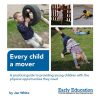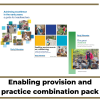Government urged to consider new funding options for early childhood education and care
A coalition of Early Years organisations convened by Kindred2 , including Early Education and providers such as LEYF and Ark Start, has identified a series
In response to the growing concerns of its membership related to children and their families living in poverty we asked members, in May last year, to tell us what they were doing in their settings which might be described as beyond their expected work around children’s learning and development. This account, drawn from responses of some 100 settings, shows the additional work early years settings, primarily in England, are doing to try to alleviate the impact of poverty. We know that since the COVID-19 outbreak the challenges have increased, and the sector has had to juggle responding to increased demands with new ways of working under lockdown. The economic impact of COVID-19 is likely to be long-term meaning that systemic responses to poverty are needed. The early years sector could play its part, but if it is to do so, this work needs to be recognised and resourced by government.
Responses to the survey showed that settings were responding actively to offer practical and financial support to parents to provide food, household equipment, and additional services. Key findings were as follows:
The impact of poverty on children’s lives is something that cannot be ignored by early years settings and settings are adapting their role to meet such needs.
Inequity imperils millions of children and threatens the future of the world. (UNICEF 2016)
Early Childhood Education and Care (ECEC) has long been seen as a panacea to many inequalities in society, in areas of health, wellbeing, participation and learning. Early intervention within ECEC has often been the ‘go to’ to address inequalities and promote equality.
A decade ago, two major reports to the UK government drew attention to the view that income was not the only issue in tackling child poverty and closing the poverty gap, The Field Review on Poverty and Life Chances (Field, 2010) was sub-titled ‘preventing poor children becoming poor adults’, and drew extensively on research in many fields to argue for early intervention programmes for children living in poverty. In the following year the Allen Review (2011) focused on Early Intervention emphasising that the period from birth to three years was crucial for development and growth.
There is no shortage of evidence about the recent levels of poverty in the UK, and stories of the growth of food banks, baby boxes, clothes banks, bed donations and voluntary work to alleviate the immediate effects of poverty have been filling our newspapers on almost a daily basis. Such practical support for families is much needed, and behind every food bank donation there is a human story.
“In 2017, in a small, pretty village in northern England, the secretary of the local school went to the foodbank to collect food for a young mother, too ashamed and frightened to go herself, so that she could feed her young children. … Those families living in poverty or on low incomes are likely to be less able to give their children the opportunities that families on higher incomes can provide”. (Nutbrown 2018:77)
Despite the evidence that supporting children living in poverty is essential to their present and future growth, well-being and learning levels of government funded provision to support families seem to have decreased. In August 2009, there were 3,632 Sure Start centres, with 54% in the 30% most disadvantaged areas (Smith, Sylva, Smith, Sammons and Omonigho 2018).
“The programme started with 250 areas but grew rapidly, and changed focus from ‘communities’ to centres. Sure Start children’s centres were seen as the best location for child and family health services, and were intended to link child development, parental employment and poverty prevention. The Childcare Act 2006 required local authorities to ensure sufficient childcare for parental employment in their areas.” (Smith et al, 2018)
Government statistics vary from this study, but what is clear is that right now, this spring of 2020, the impact of the COVID 19 pandemic has plunged even more families into poverty, and restrictions imposed in the ‘lockdown’ have exacerbated the problems many families already experienced.
In a study of the work carried out by Birmingham Maintained Nursery Schools to respond to a wide and complex range of needs of their children and families Pascal and Bertram (2019) point out that:
“…complex needs go far beyond the child’s learning and development and include wider family needs for help with basic life requirements such as housing, food, safety, debt management and drug and substance abuse and the differential impact of austerity on the poorest in society”. (p.3).
The report calculated that:
“Birmingham’s MNS are currently contributing over £16 million per year through the additional non-funded services they provide to 4,613 of the most vulnerable children and families in the city. This contribution is made through cost efficiencies, unpaid hours, practitioner goodwill and professional generosity …” (p.16).
Some 55% (50) of respondents to the Early Education survey, reported that their setting supported families by providing free food , clothing schemes, washing facilities and other practical support and services. 33% (30) of settings reported paying for school meals from school budgets and in 71% (65) of settings outings and additional costs were met from school funds. Families were supported to make benefit claims by 70% (60) settings, and 31% (29) of settings had staff qualified to dispense foodbank vouchers. Practical support with housing and with essential furniture (such as beds for children) was given by 34% (31) settings. The majority of settings (95% (87) reported that they signposted families to other organisations for support. The types of support and the examples of poverty related needs experienced by families was extensive.
It is clear that many settings provide a range of support, financial, practical and involving other services, to address the impact of poverty on the lives of many children and their families.
Members reported their work relating to several areas of need:
“We set up our own charity to help families in need in our city. Last year we estimate we saved the local authority £185K – meeting court and care costs with families kept together.“
Many settings have responded to the current Pandemic by staying open for children in government identified categories, with their staff becoming “critical workers” overnight. In addition to providing for children still attending and supporting home learning for those staying at home, settings have been supporting families whose incomes and well-being have plummeted due to government action on COVID 19. It is now not at all unusual to find early years settings where staff are working not only to support the learning and development of young children, but also to support with housing, food, benefit claims and health needs.
In our survey of our members in April 2020, the two greatest concerns were the impact of COVID-19 on the most vulnerable children and families, and the financial impact on families. Although vulnerable children have been eligible to continue attending settings, many have not done so. Staff have tried to keep in touch with them remotely, but the loss of regular face to face contact has meant that it has been harder to provide support, and some families have dropped out of contact. Meanwhile, others who have faced challenges such as loss of employment, financial difficulties or bereavement, may not have been picked up as newly vulnerable. Financial challenges have increased, and with younger children not eligible for free school meal (FSM) support, there have been concerns that these children have not had the same safety net as older ones, despite those on the 2-year-old offer or receiving Early Years Pupil Premium having similar profiles to older children receiving FSM support. Members reported families struggling to access Universal Credit or waiting for payments to arrive, with particular concern about families with no recourse to public funds and those on zero hours contracts. Some providers continued to find ways to provide food for families from food banks or paid for by staff, but they asked where was the government support that was needed.
The pandemic has highlighted the critical role that Early Years settings and services play in supporting families and their young children. It raises questions as to why they are being asked to step in and stop families from falling through the cracks in the welfare state. We know this is happening throughout the education sector. As we go forward, the early years and schools need to be properly resourced to continue supporting our most vulnerable children, and government needs to take a stronger role in eradicating poverty, and addressing the reasons why so many families do not have the income they need to give their children the basics.
We are grateful to the headteachers and staff of settings which responded to our survey and in particular to the following for additional information about their work to support families needing additional support:
Cathy Nutbrown is President of Early Education, Verity Campbell-Barr is Chair of Trustees of Early Education, Beatrice Merrick is Chief Executive of Early Education
Allan, G. (2011). Early Intervention: The Next Steps An Independent Report to Her Majesty’s Government The Cabinet Office, London: HM Government
Nutbrown, C. (2018). Early Childhood Educational Research: International Perspectives. London: Sage.
Pascal, C, and Bertram, T. (2019). The Unique and Added Value of Birmingham’s Maintained Nursery Schools Birmingham, Centre for Research in Early Childhood (CREC)
Smith, G., Sylva, K., Smith, T., Sammons, P. and Omonigho, A. (2018). STOP START: Survival, decline or closure? Children’s Centres in England, 2018 London: The Sutton Trust
UNICEF (2016) The State of the World’s Children: A fair chance for every child New York: UNICEF
A coalition of Early Years organisations convened by Kindred2 , including Early Education and providers such as LEYF and Ark Start, has identified a series
We urge members to respond to the two DfE consultations on funding and ratios which close on 16 September. For information, you can view the
We welcome today’s announcement from government that it intends to allocate a further £10m to raise the level of supplementary funding for those maintained nursery
The Times Education Commission has today published a report which calls for “A significant boost to early years funding targeted at the most vulnerable and
Government has today published its Schools White Paper “Opportunity for all”. We welcome the fact that early years gets a few mentions: However, the “key
DfE has just published new figures on the number of new entrants to Early Years Initial Teacher Training (EYITT). This is the route that leads to
Organisations representing Maintained Nursery Schools have joined together to warn the government that it must provide a long-term funding solution for Maintained Nursery Schools (MNS)









Early Education
2 Victoria Square
St Albans
AL1 3TF
T: 01727 884925
E: office@early-education.org.uk